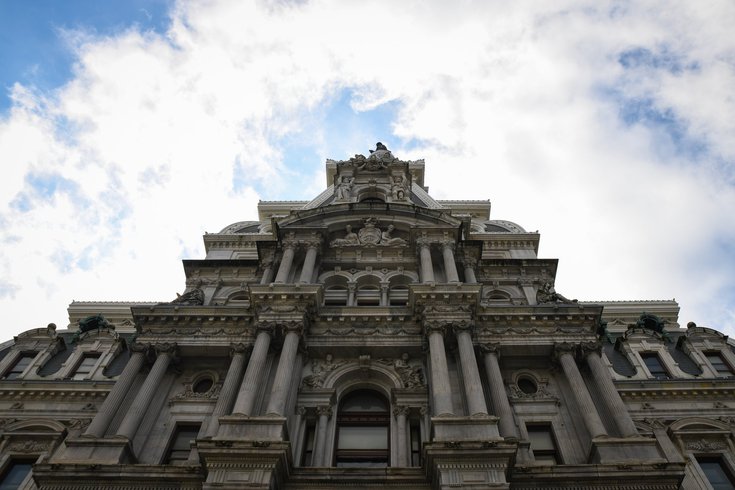
May 17, 2023
 Kate Frese/For PhillyVoice
Kate Frese/For PhillyVoice
Philadelphia voters approved ballot measures that require the city to add more money to its rainy day fund, create a new public safety director position and establish a Commerce Department division devoted to workforce development.
Philadelphia voters handily voted "yes" on three of the four municipal ballot measures put before them during Tuesday's primary election.
Voters approved measures to increase the city's "rainy day fund," create a high-ranking, public safety director position and establish a new Department of Commerce division focused on workforce development.
The other measure, which would exempt all staff members of the Citizens Police Oversight Commission from taking civil service tests, appeared headed for rejection as of Wednesday morning. About 54% of voters voted against the measure, with 89% of divisions reporting.
Here's a breakdown of how Philly voters responded to each ballot question:
The city's Budget Stabilization Reserve, otherwise known as its "rainy day fund," stores surplus revenues for an extended period of time to cover unexpected costs, emergencies and budget shortfalls. In other cities with similar funds, the money has been used to ease the burden of economic downturns or support cities during the COVID-19 pandemic.
The rainy day fund's $34.3 million balance was exhausted early in the pandemic, with officials not planning to contribute to it for the next five years. Though the money was later replenished with pandemic relief funding, a change was proposed by Councilmember Katherine Gilmore Richardson earlier this year to provide more frequent deposits to ensure the city has money in its coffers for emergencies.
The approval of this measure requires the city's finance directors to make projections about the funding threshold of the rainy day fund by Feb. 14, using the same year's fiscal budget. It also raises the amount of money set aside based on the remaining balance.
This measure gained the support of 67.13% of voters, with 89% of divisions reporting.
The city's Commerce Department has long been responsible for promoting economic development, developing opportunities for business growth and providing resources to the city's workers to prepare them for careers in family-sustaining jobs. Within that department is the Office of Business Development and Workforce Solutions, which works to attract companies to the city and retain the ones that are here.
The proposal, put forth by Councilmembers Darrell Clarke and Katherine Gilmore Richardson, was unanimously approved by City Council earlier this year and received support from the Kenney administration.
Its approval by voters requires the Commerce Department to create the Division of Workforce Solutions. It will focus on promoting workforce development programs and connect residents to job training and employment opportunities in the public and private sectors. It will be led by existing members of the Commerce Department.
This measure gained the support of 64.82% support, with 89% of divisions reporting.
The Citizens Police Oversight Commission is an oversight agency designed to ensure just, transparent and efficient administration of criminal justice in Philadelphia. It investigates the Philadelphia Police Department's conduct and policies. Initially formed in 1993, the commission was revamped in 2021 to improve the relationship between police and the community.
The nine commissioners are exempt from civil service, a merit-based system for evaluating candidates for city jobs that ranks applicant test scores. Most Citizens Police Oversight Commission staff members, like the majority of city workers, are required to complete the testing requirements before being considered.
The rejection of this measure would mean applicants for jobs with the Citizens Police Oversight Commission must complete the city's civil service hiring requirements. Perspective staff would need to complete the entrance examinations and have their scores ranked before being considered for open positions.
This measure has been rejected by 53.84% of voters, with 89% of divisions reporting.
The proposal to create a government office to oversee Philadelphia's public safety efforts almost didn't make it to the ballot due to a veto from Mayor Jim Kenney earlier this year. Shortly after the mayor wrote a letter to City Council explaining his reasons for opposing the legislation, City Council unanimously voted to override his veto and put the proposal on the ballot.
The position is modeled after similar roles in cities like Newark, Chicago and Columbus. To draft the legislation, members of City Council took several trips to those areas to observe the ways they are grappling with gun violence.
The approval of the measure requires the city to add a cabinet-level appointee who will be responsible for coordinating the deployment of resources within the city's police, fire, recreation and emergency services departments. The public safety director will guide city agencies through safety-related policies, provide budget counseling, oversee security in city-owned buildings and develop security contracts for the city and School District of Philadelphia.
It is unlikely that Kenney would appoint the city's first public safety director. Rather, city's 100th mayor — either Cherelle Parker or David Oh — would be the first to appoint the high-ranking government official.
This measure gained the approval of 60.80% of voters, with 89% of divisions reporting.